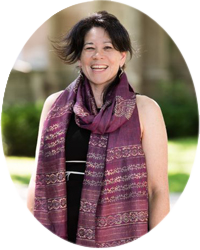
1. What is your current role/title?
I serve as Associate Provost for Academic Innovation and Strategic Initiatives.
2. Where did you earn your degrees and what did you study?
BA (Political Science), Reed College
AM (Political Science), University of Illinois, Urbana-Champaign
PhD (Political Science), University of Illinois, Urbana-Champaign
I benefited enormously from faculty mentorship at my college, which was a very academically rigorous environment which attracted many students from highly prepared, privileged backgrounds. For a first-generation student who experienced doubts about my own capabilities and belonging on such a campus, it was so valuable to have a faculty mentor who provided invaluable feedback on everything from my senior thesis to guidance about graduate school, and what a career in academia would involve. Even one person to connect with can make such an important difference—something I’ve tried to remind myself throughout my own career. At my graduate institution, close friendships and a support network of peers in the program provided camaraderie and help in so many ways—tackling the curriculum, finding an area of specialization, completing the dissertation, and navigating the job market after graduate school. The department provided many valuable opportunities to learn the profession and work with each other through research and teaching fellowships. There was ample support for conference travel and research, which extended to a fellowship year at Oxford University while completing my dissertation.
4. What excites you about equity work at your institution?
More than anything, the opportunity to contribute to the work of creating access to higher education regardless of race, income, or family background, particularly at a time when Black student enrollment has dropped by 29% in Illinois. As Illinois’ only four-year Predominantly Black Institution as designated by the U.S. Department of Education, Chicago State University is laser focused on closing equity gaps. As a part of our 2020 – 2025 Strategic Plan, Chicago State University is committed to building student support scaffolding that increases rates of persistence and reduces the time to degree completion. This work is in motion with the launch this summer of Cougar Commitment, a holistic, data-driven set of strategies to improve student success. A prong of Cougar Commitment is Rise Academy, which gives freshmen a year-long full-tuition scholarship, a summer bridge course, and intensive academic advising. Exciting innovations like this, which bring together faculty, administrators, students, donors and the community, help me to believe that together we will make a difference in creating a society that values education and works to reduce the barriers to entry for everyone.
5. In your role, how do you impact equitable outcomes for your students?
Chicago State University has a comprehensive approach to student success, from developing college-ready high school students to preparing our scholars to succeed in their careers. Further, the University recognizes that investments in our community facilitate student success. As Associate Provost for Academic Innovation and Strategic Initiatives, I play a leadership role in projects across this spectrum, and am privileged to collaborate on projects with our college deans and department chairs, members of President Scott’s team, and external allies in this work like the Partnership for College Completion. Recent efforts include collaborating across the university to create our ILEA Equity Plan, where we discovered the relative success of transfer students in on-time degree completion compared to first-time full-time freshmen. We are digging into the reasons for that and simultaneously developing assessment tools to measure the impact of a series of integrated, holistic student support programs that have been put into place. CSU is committed to restructuring higher education to increase access for all learners in our undergraduate and graduate degree programs, through certificate and stackable credential programs, and by removing barriers to entry and completion, wherever they might be.


